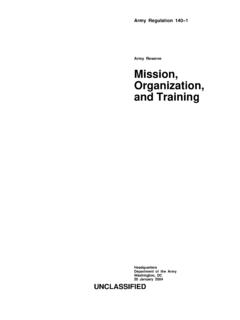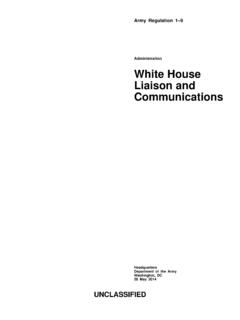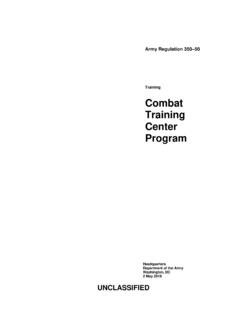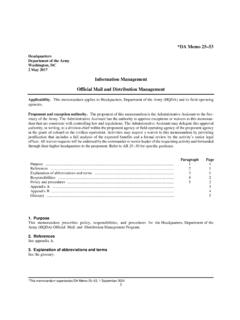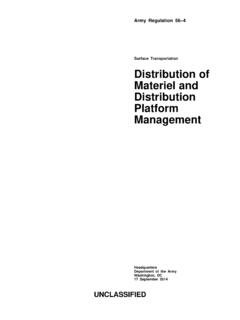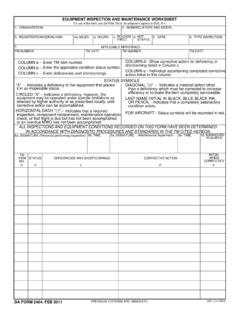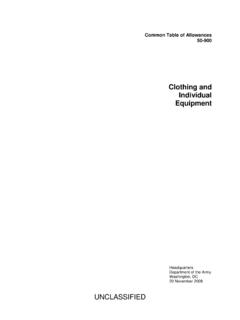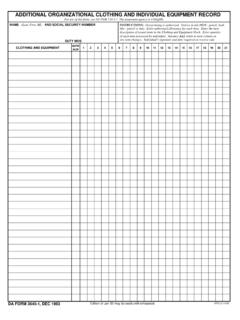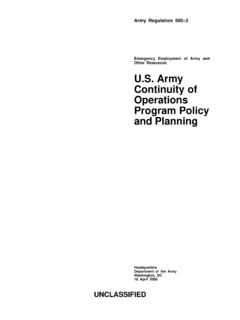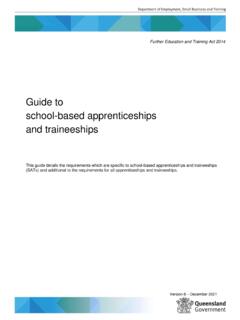Transcription of 1 1 MAR 2015 - United States Army
1 SECRETARY OF THE army . WASHINGTON. 1 1 mar 2015 . MEMORANDUM FOR SEE DISTRIBUTION. SUBJECT: army Directive 2015 -12 (Implementation Guidance for Credentialing Program and Career Skills Program). 1. Purpose. This directive supersedes reference a and implements reference b (Department of Defense (DoD) Instruction (Job Training, Employment Skills Training, Apprenticeships, and Internships (JTEST-AI) for Eligible Service Members). It provides implementation guidelines for the army Credentialing Program and Career Skills Program (CSP) authorized and directed by Congress, the Secretary of Defense and the Department of the army in references c through g. A list of references is at enclosure 1. 2. Background. The army Credentialing Program and CSP are elements of the Military Life Cycle model that encourages Soldiers to capitalize on training and development opportunities throughout their military careers so that they grow and develop as Soldiers fully capable of serving our Nation-while in uniform and as civilians after their military service.)
2 3. Credentialing. The army encourages Soldiers to obtain industry-recognized credentials related to their military occupational specialties (MOSs) because we recognize the value of professional credentials as clear, objective evidence of an individual's competence that contributes to improved capabilities and readiness in our military force. a. The Commanding General, army Training and Doctrine Command (TRADOC) and Commanding General, army Medical Command (MEDCOM) must conduct army credentialing programs for select Soldiers as part of initial and mid-level professional military education. Within 1 year of the issuance of this directive, the Commanding General, TRADOC and Commanding General, MEDCOM will issue procedural guidance for approving, implementing and evaluating credentialing programs at army Centers of Excellence. In turn, army training institutions will make information on civilian credentialing opportunities available to Soldiers during every level of MOS.
3 Training. b. In accordance with references c and f and the policy at enclosure 2, army appropriated funds may pay for the fees associated with coursework, licensing and examinations leading to credentialing, licenses and certifications. Appropriated funds may also pay for the maintenance of credentials, licenses and certifications, once obtained, if the credential covers the preponderance of the Soldier's current or prior SUBJECT: army Directive 2015 -12 (Implementation Guidance for Credentialing Program and Career Skills Program). assigned duties and the MOS proponent has approved the credential for those assigned duties. c. Individuals may pursue professional credentialing as a self-directed postsecondary school activity, a part of a military/industry partnership or an agreement coordinated by army training institutions. All Soldiers should consult the army Credentialing Opportunities On-Line (COOL) Web site ( ) and be referred to local education and Soldier for Life Transition Assistance Program counselors to discuss credentialing opportunities applicable to the Soldier's specific goals and interests and explore resourcing options not associated with MOS training at TRADOC or MEDCOM institutions.
4 Soldiers must meet with an education counselor within 90 days of arrival at their first permanent duty station and with Soldier for Life Transition Assistance Program counselors as part of their transition. 4. Career Skills Programs. CSPs, such as apprenticeships, on-the-job (OJT) training, job shadowing, employment skills training and internships, offer skills training opportunities to Soldiers preparing to transition from military to civilian employment. As such, CSP activities fall under the umbrellas of training and transition, and should not be misconstrued as education programs. a. On behalf of the Deputy Chief of Staff (DCS), G-1, The Adjutant General of the army , army Human Resources Command (HRC) is the proponent for this policy. Together with army Installation Management Command (IMCOM), HRC will assess the overall effectiveness of career skills training, including apprenticeship programs.
5 HRC will review and vet all new CSPs, pilots or initiatives. b. The Commanding General, IMCOM will manage and execute all CSPs on army installations and verify and report on Soldiers attending all CSPs, including those off installations. The commanding general will also: (1) publish instructions for processing initial proposals for CSP. (2) provide monthly reports and assessments on CSP (enclosure 5) to HRC via automated procedures coordinated between HRC and IMCOM. c. Communication efforts assist in connecting transitioning Soldiers with employers. Education counselors and unit leaders should refer to their individual public affairs marketing plans for guidance and assistance in conducting strategic outreach to enable and assist Soldiers in successfully preparing for their transition from the army . 2. SUBJECT: army Directive 2015 -12 (Implementation Guidance for Credentialing Program and Career Skills Program) - d.
6 To be eligible to participate in a CSP and be released from daily unit duties, a transitioning Soldier must have completed at least 180 continuous calendar days of active duty service in the army and must expect to be discharged or released from active duty within 180 calendar days of the start date of participation in a CSP. Soldiers enrolled in the Integrated Disability Evaluation System (IDES) or assigned to a Warrior Transition Unit/Community Care Unit (WTU/CCU) may begin a CSP. 85 calendar days after their medical retention determination point, which is in accordance with the DoD timeline in reference h (180 days before release from active duty for IDES participants). army Reserve Component Soldiers will not extend their active duty orders for the specific intent of participating in a CSP unless transferred to a WTU/CCU. A Soldier must also anticipate a character of service upon separation of honorable or under honorable conditions to be eligible.
7 E. The approval authority to participate in CSP is the transitioning Soldier's battalion/squadron commander. This authority may not be delegated. The approval authority will establish personnel accountability procedures as part of the condition of approval. f. The approval authority may terminate a Soldier's participation in a CSP based on mission requirements. Upon notification that participation is terminated, a participating Soldier must immediately withdraw from the CSP and report to his/her unit of assignment. g. Soldiers assigned to a WTU/CCU will follow army Warrior Transition Command standing operating procedures for participating in the Education and Employment Initiative (E21) and Operation WARFIGHTER (OWF) programs. Those procedures include the requirement to be career and education ready before participating in E21/0WF and to coordinate all E21/0WF activity with the WTU Transition Coordinator.
8 E21 programs may include apprenticeships, pre-apprenticeships, employment skills training and internships with non-Federal governments, nonprofit organizations or private entities. WTU/CCU Soldiers may also participate in a CSP at the local installation. h. Transitioning Service members from other Military Services are not restricted from participating in an army CSP unless installation workload or other unusual circumstances dictate. Reasonable effort will be made to accommodate all eligible personnel from other Military Services provided that the army does not incur additional costs from the accommodation. 5. Appropriated funds may not be used to pay for credentialing that is undertaken solely as part of a Soldier's transition from the army to civilian life or to compensate 3. SUBJECT: army Directive 2015 -12 (Implementation Guidance for Credentialing Program and Career Skills Program).
9 Either an organization providing CSP opportunities or Soldiers taking part in a CSP, other than for incidental expenses, such as utilities for on-post facilities used for conducting a CSP. In accordance with reference m, army tuition assistance funds will not be used to pay for Soldier credentialing examinations. 6. CSP support management is assigned to Management Decision Package army Career and Alumni Program in the II Program Execution Group under the purview of the Assistant Chief of Staff for Installation Management. Keeping in mind the current austere fiscal environment and the army 's priorities in the areas of training and readiness, resource administrators should judiciously and frugally build their commands'. requirements and justifications. 7. The servicing Staff Judge Advocate (SJA) will review all credentialing and CSPs, including agreements with commercial partners. As part of the comprehensive legal reviews , the servicing SJA Office will review any potential gifts or benefits provided to Soldiers by educational institutions or commercial entities to ensure compliance with reference i, which limits the ability of Soldiers to accept gifts.
10 Gifts are broadly defined to include any gratuity, favor, discount or other item having monetary value; services;. and gifts of training. Examples of potentially prohibited gifts include, but are not limited to, free or reduced education costs, access to free or reduced examinations, and free or discounted training materials or supplies, unless the discounts and benefits are offered to all military personnel regardless of rank or position. 8. This directive serves as authorization for commanders to implement credentialing and career skills programs; it does not mandate their existence at every army installation. Commanders should implement credentialing and career skills programs in accordance with the guidelines outlined in this directive, as well as unit training priorities, available resources, army mission requirements, relationships with industry partners and the needs for skilled labor in a particular location or region.
